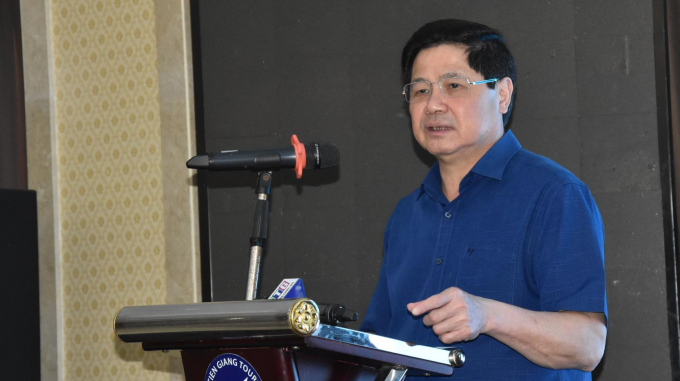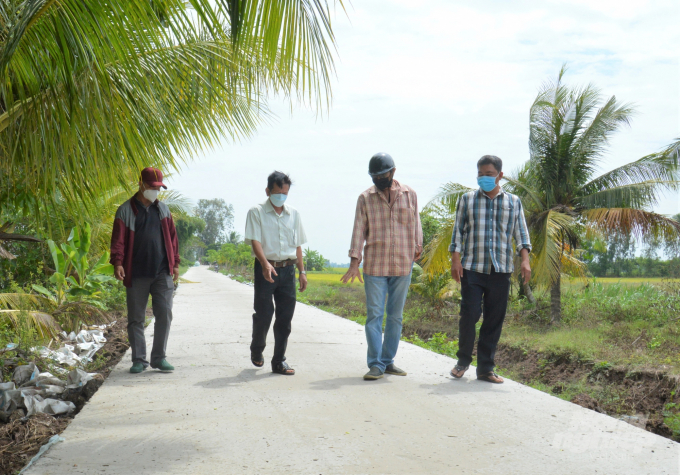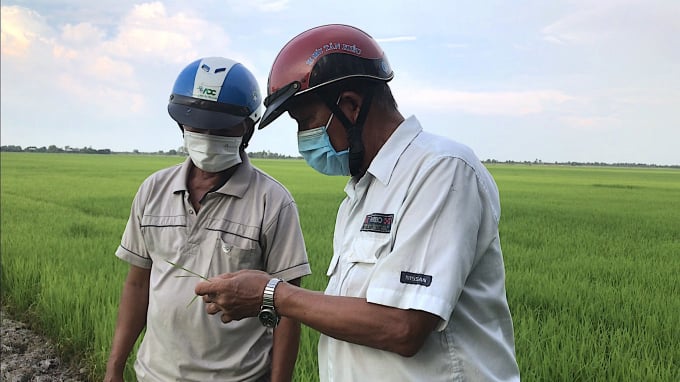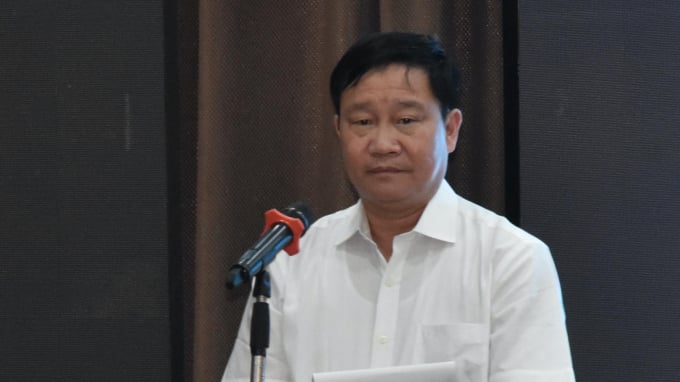May 24, 2025 | 21:42 GMT +7
May 24, 2025 | 21:42 GMT +7
Hotline: 0913.378.918
May 24, 2025 | 21:42 GMT +7
Hotline: 0913.378.918
On March 16, the VnSAT Management Board (MB) conducted a conference in Tien Giang province to accelerate the implementation of the 2022 plan's rice plant component. The project lasts from 2015 to 2022 in eight provinces and cities along the Mekong Delta.
This includes the period from 2021 to 2023 as an extended-term, mostly for investment in infrastructure and equipment to assist farmers. At the conference, the local VnSAT Project Management Board identified challenges and potential solutions to expedite development in the next months.

Deputy Minister of Agriculture and Rural Development Le Quoc Doanh spoke at the Conference on March 16. Photo: Minh Dam.
According to VnSAT project MB, Mekong Delta province invested about VND 1,094 billion in 86 public investment subprojects between 2021 and 2022 (including 87 contract packages). To date, the percentage of packages contracted to provinces has been 100%. The majority of contracts were handed in October 2021's second half.
Due to the effect of the rainy season in the South and the Covid-19 pandemic, the local VnSAT Project MB and contractors were not able to accelerate construction progress until the end of November 2021. Until recently, the VnSAT construction contract package has mostly responded to the desired progress rate, which is typically between 40% and 50% of the contract volume.
Certain provinces, including Soc Trang and Tien Giang, achieve a progress rate of 60% to 70% of contract volume. Additionally, the MB of the VnSAT project highlighted that some subprojects assisting farmer organizations from the previous time remain incomplete. In particular, Kien Giang province has three infrastructure subprojects supporting farmer groups that remain unfinished and will require reciprocal funding to complete. Certain provinces, notably Tien Giang (4 machines), Long An (3 machines), and Soc Trang (2 machines), have not finished the installation of dryers (reciprocal capital) because of the complicated development of the Covid-19 pandemic.
Additionally, material prices (oil, petroleum, sand, rock, iron, and steel...) skyrocket, adversely impacting the rate of construction progress. The direction of assistance from investors and certain VnSAT MBs at the local level has not been drastic, and contractor disqualification has also slowed the pace of several constructions.

Deputy Minister of Agriculture and Rural Development Le Quoc Doanh suggested localities focus on speeding up the construction progress rate of the VnSAT project and complete it on time. Photo: MD.
Concerning solutions to the challenges in Kien Giang, Mr. Tu Thanh Long, deputy director of the province VnSAT MB in Kien Giang, reported that the provincial VnSAT MB recruited contractors and handed over the surface for three old subprojects. Following rice harvest, local farmers will hand it over to contractors. Progress on new sub-projects has reached around 55% thus far. Two subprojects are behind schedule by 10% and 24%, respectively. The reason for this is that a new contract was handed in February 2022. However, the city is committed to making progress by June 30 of this year, within the allowed time frame.
According to VnSAT MB, Dong Thap is also one of the provinces that are making significant progress and have a good chance of finishing the project on time. At the moment, new sub-projects are progressing at a rate of 45 percent. According to the leader of the MB in Dong Thap province, there are 10 out of 12 sub-projects relating to sand materials. Recently, when the price of sand increased, contractors encountered problems, resulting in the suspension of three subprojects. Additionally, the Covid-19 outbreak has a negative impact on construction manpower. Since the Lunar New Year, the VnSAT Dong Thap Project Management Board has emphasized the need for contractors to accelerate construction and complete it on time.
Tien Giang province is an outstanding example. Mr. Cao Van Hoa, deputy director of the province's MB, stated: "Up to now, the construction progress rate of the subprojects has been around 60-70 percent, while some others have been completed and are awaiting acceptance. We anticipate completing acceptance for subprojects within the coming May."

The VnSAT project has changed the rice farming habits of over 200,000 farmers in the Mekong Delta. Photo: HD.
Currently, 88 of 91 subprojects from the previous period have been finished and put into service, receiving widespread praise from communities. Mr. Tran Thai Nghiem, deputy director of the Can Tho Department of Agriculture and Rural Development, stated that the project's investment in electric pumping stations for farmers' organizations is extremely successful, particularly in light of the recent increase in fuel costs.
According to Mr. Nghiem, Can Tho city is now implementing ten sub-projects. Currently, implementation progress has ranged between 62 and 65 percent, with four sub-projects exceeding 75 percent. "We are actively working to complete these four sub-projects in time to commemorate the April 30 event. Can Tho is committed to finishing the remaining six sub-projects on time, "Mr. Nghiem said.
At the conference, Deputy Minister of MARD Le Quoc Doanh stated that the World Bank strongly praises the VnSAT Project. It changes farmers' rice and coffee-producing habits and practices. The Deputy Minister expressed his appreciation for local governments' efforts to expedite the construction and investment development of sub-projects in the Mekong Delta. However, the project's duration is quite short. As a result, it is recommended that local governments focus on a variety of issues in order to ensure the project's fulfillment.
Mr. Le Van Hien, MB's agricultural project leader and head of the VnSAT Project, explained that the World Bank is financing the project for two commodities: coffee and rice. The project's objectives have been mostly met and surpassed by 20% after six years of implementation.

Mr. Le Van Hien, Director of the VnSAT Project Management Board said that the VnSAT project has made a very active contribution to the construction of new rural areas in the localities. Photo: Minh Dam.
The World Bank lauded the training for coffee replanting, as well as the procedures of "3 decrease, 3 increase," and "1 must 5 decreases" for the rice component, as one of the typical projects. After the project concluded, the added value for coffee would be about 20% higher than it had been previously, while the added value for rice would be 25% higher.
Around 200,000 rice farmers in the Mekong Delta and 150,000 coffee producers in the Central Highlands have benefited significantly from the VnSAT program. Infrastructure investment sub-projects have made a significant contribution to new rural building in the Mekong Delta's rice component. Numerous farmers' lives have been greatly enhanced as a result of the Project's traffic and irrigation improvements.
Le Quoc Doanh, Deputy Minister of MARD, directed the Central VnSAT Project Management Board to coordinate with localities to examine each subproject, particularly for places where subprojects may not be finished on time. Concerning the backlog of prior phase sub-projects, Deputy Minister Le Quoc Doanh urged that they be finished entirely by April 30.
Despite the rush, Deputy Minister Le Quoc Doanh emphasized the importance of localities in ensuring the quality and sight of the works. Additionally, local governments should continue to undertake "soft" operations, such as regularly guiding replication of rice farming technological solutions such as "3 decrease, 3 increase," and "1 must 5 decreases." With the price of fertilizer increasing, the VnSAT project's technical breakthroughs will contribute to lowering the cost of rice cultivation and increasing revenues for the people.
Translated by Linh Linh

(VAN) The People's Committee of Tra Vinh province has approved an adjustment to the investment policy for the Green Hydrogen Plant project, increasing its area to approximately 52.76 hectares.
![Reducing emissions from rice fields: [2] Farmers’ commitment to the soil](https://t.ex-cdn.com/nongnghiepmoitruong.vn/608w/files/news/2025/05/05/dsc08881jpg-nongnghiep-140632.jpg)
(VAN) Clean rice cultivation model in Thuong Tan commune, Bac Tan Uyen district, is assisting local residents in achieving sustainable agriculture by substantially reducing costs, increasing productivity, and protecting the environment.

(VAN) At the conference to disseminate Resolution No. 68, AgriS introduced its digital agricultural ecosystem and reaffirmed its commitment to accompanying the Government in promoting private sector development and sustainable agriculture.

(VAN) 'Blue Ocean - Blue Foods' initiative is designed to restore marine ecosystems and establish sustainable livelihoods for local communities by cultivating a minimum of 1,000 hectares of cottonii seaweed in the first three years.
/2025/05/21/4642-3-112707_603.jpg)
(VAN) The V-SCOPE project has made direct contributions to three out of six pillars of the Comprehensive Strategic Partnership between Vietnam and Australia.

(VAN) Facing the threat of rabies spreading to the community, Gia Lai province urgently carries out measures to vaccinate dogs and cats on a large scale.

(VAN) Disease-free livestock farming not only protects livestock herds but also stabilizes production and livelihoods for many farmers in Tuyen Quang.